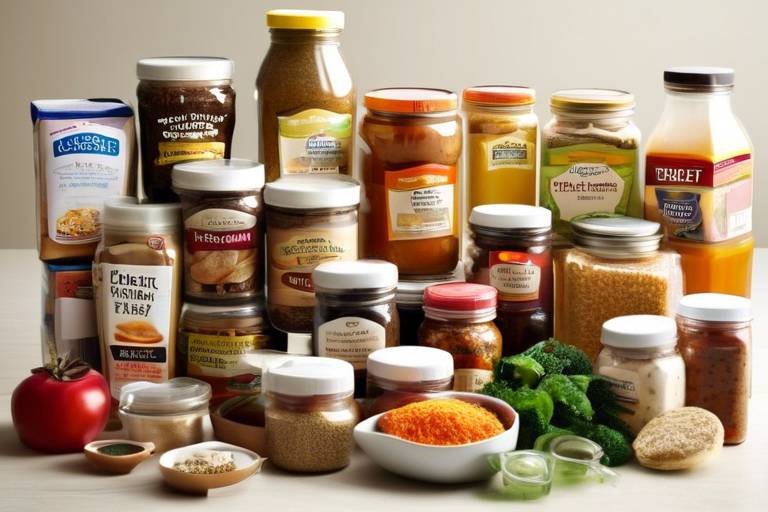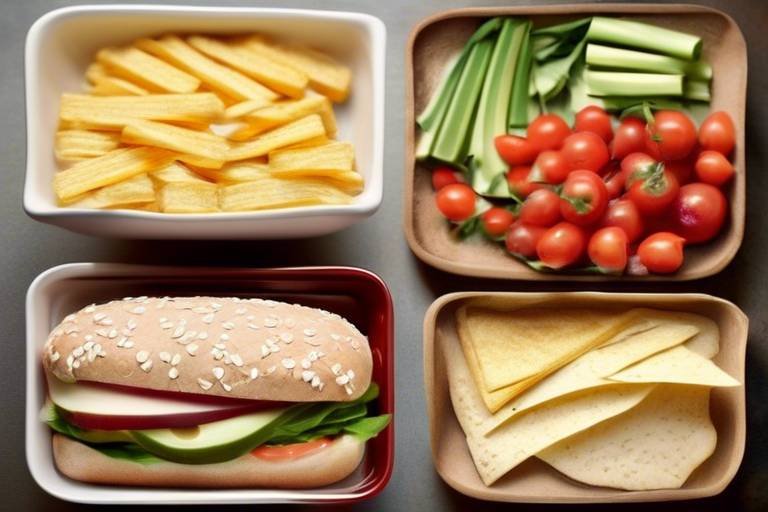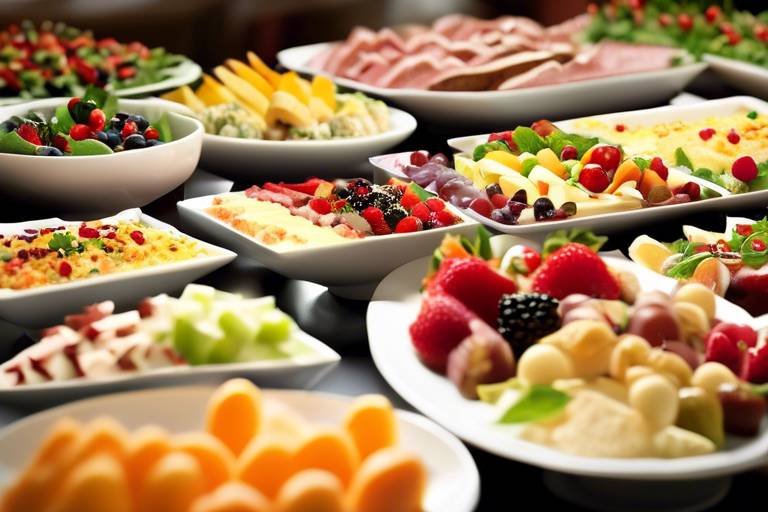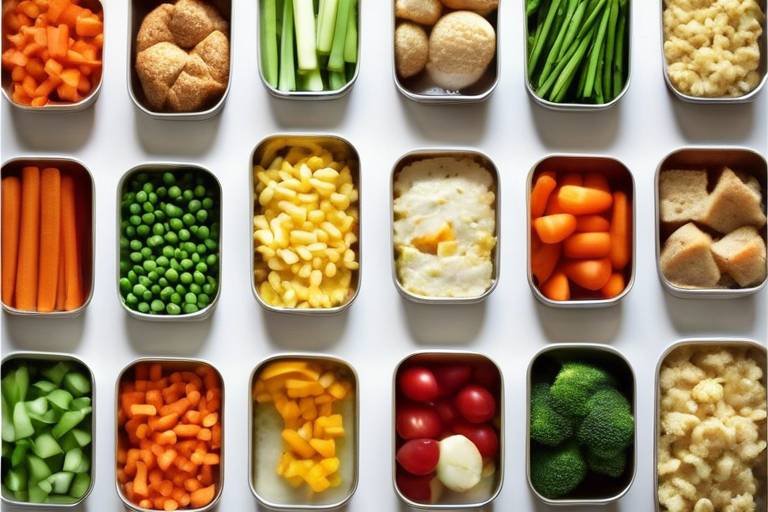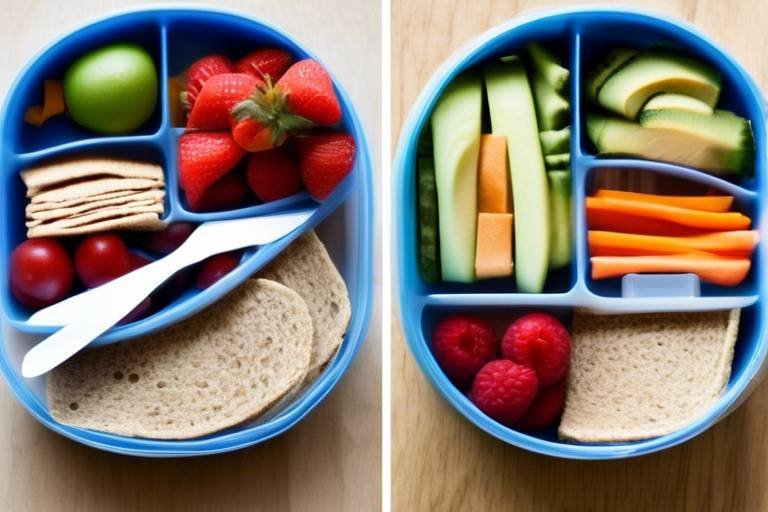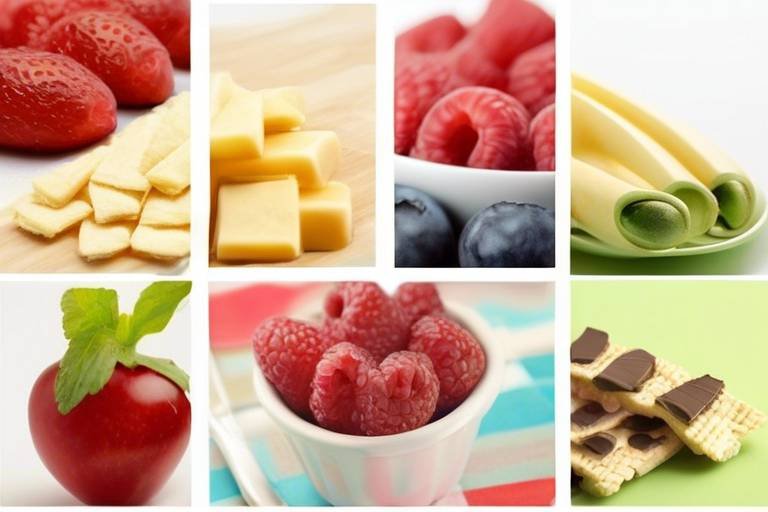How Can Nutritious Meals Improve Your Child's Concentration?
In today's fast-paced world, the importance of nutrition cannot be overstated, especially when it comes to our children's ability to concentrate. Have you ever noticed how your child seems to lose focus during a long homework session or struggles to pay attention in class? Well, the solution might be simpler than you think! By providing nutritious meals, you can significantly enhance your child's concentration, paving the way for better academic performance and cognitive development.
Imagine your child's brain as a high-performance engine. Just like a car needs the right fuel to run smoothly, our brains require essential nutrients to function at their best. A balanced diet filled with vitamins, minerals, and healthy fats can be the key to unlocking your child's full potential. Think of it this way: if you want your child to race ahead in their studies, you need to fuel them with the right foods that will keep their mental engine revving at peak performance.
Research has shown a direct link between diet and cognitive function. Children who consume a variety of nutritious foods tend to exhibit better memory, improved attention spans, and enhanced learning abilities. It's like giving them a secret weapon in their academic arsenal! So, what does it mean to eat nutritiously? It means incorporating a wide range of foods that deliver the vital nutrients necessary for optimal brain health.
For instance, consider the role of omega-3 fatty acids. These essential fats are not just buzzwords; they are crucial for brain development and function. Found in foods like fatty fish, flaxseeds, and walnuts, omega-3s have been linked to improved memory and learning capabilities. By including these foods in your child's diet, you're essentially giving their brain a much-needed boost. Plus, it can be as easy as adding a serving of salmon to their dinner or tossing some chia seeds into their morning smoothie!
Moreover, antioxidants play a significant role in protecting the brain from oxidative stress. Foods rich in antioxidants, such as berries, dark chocolate, and leafy greens, can help contribute to better mental clarity and concentration. Just picture this: a colorful plate filled with vibrant fruits and veggies not only looks appealing but also packs a powerful punch of nutrients that can enhance your child's focus throughout the day.
Meal planning is another essential aspect of ensuring your child receives the nutrition they need. A well-thought-out meal plan can make a world of difference. By incorporating a variety of foods rich in essential nutrients, you can help improve your child's focus and overall cognitive performance. For example, starting the day with a balanced breakfast can set the tone for sustained concentration. Think oatmeal topped with fresh fruits, or eggs scrambled with colorful vegetables.
In addition to breakfast, providing healthy snacks throughout the day can help maintain energy levels and focus. Snacks like nut butter on whole-grain bread, fruit smoothies, or veggie sticks with hummus are excellent choices. These options not only satisfy hunger but also keep their brains fueled and ready to tackle whatever challenges come their way.
In conclusion, the connection between nutritious meals and improved concentration in children is undeniable. By focusing on a balanced diet filled with essential nutrients, parents can create an environment that fosters cognitive growth and academic success. So, the next time you're planning meals for your little ones, remember: you have the power to enhance their concentration just by what you put on their plates!
- What are some quick nutritious meal ideas for busy parents? Consider options like overnight oats, smoothies packed with fruits and spinach, or whole-grain wraps filled with lean protein and veggies.
- How can I encourage my child to try new healthy foods? Make it fun! Involve them in meal prep, offer a variety of colors on their plate, and try to lead by example by enjoying healthy foods yourself.
- Are there any specific foods to avoid for better concentration? Yes, try to limit sugary snacks and processed foods, as they can lead to energy crashes and decreased focus.

The Importance of Nutrition for Cognitive Development
Understanding how nutrition affects brain function is crucial for every parent aiming to boost their child's academic performance and cognitive abilities. Just like a car needs the right fuel to run efficiently, our brains require a balanced diet to function optimally. A well-rounded diet provides essential nutrients that support cognitive growth, impacting memory, attention, and overall learning capabilities in children. Imagine trying to solve a puzzle with missing pieces; that's what a lack of proper nutrition does to a child's brain. It hampers their ability to concentrate and process information effectively.
Research has shown that children who consume a nutrient-rich diet tend to perform better academically. This is because certain foods can enhance brain health, leading to improved focus and learning abilities. For instance, when children eat a variety of fruits, vegetables, whole grains, and healthy fats, they are supplying their brains with the vitamins and minerals needed for optimal performance. Nutrients like iron, zinc, and vitamins B and D play a significant role in brain development and function. A deficiency in these nutrients can lead to difficulties in concentration and learning.
Moreover, establishing healthy eating habits early on can set the stage for lifelong wellness. Just as we nurture our bodies with exercise, we must also nourish our minds with the right foods. Children are like sponges, absorbing everything around them, including dietary habits. If they see their parents prioritizing nutritious meals, they are more likely to adopt similar habits themselves. This creates a positive feedback loop, where good nutrition leads to better cognitive function, which in turn encourages more healthy eating.
To illustrate the impact of nutrition on cognitive development, consider the following table that outlines essential nutrients and their benefits:
| Nutrient | Benefits for Cognitive Development |
|---|---|
| Omega-3 Fatty Acids | Supports brain development and improves attention span |
| Antioxidants | Protects the brain from oxidative stress and enhances mental clarity |
| Vitamins B & D | Essential for energy production and cognitive function |
| Iron | Crucial for transporting oxygen to the brain, improving focus |
| Zinc | Supports memory and learning abilities |
In conclusion, the link between nutrition and cognitive development is undeniable. By prioritizing a balanced diet, parents can significantly enhance their children's concentration and learning capabilities. It's all about making smart food choices that pave the way for brighter futures.
1. How does nutrition affect my child's concentration?
Nutrition provides the essential nutrients that support cognitive functions like memory and attention. A balanced diet can enhance your child's ability to focus and learn effectively.
2. What are some quick ways to improve my child's diet?
Incorporate more fruits, vegetables, whole grains, and healthy fats into their meals. Simple changes, like adding berries to breakfast or nuts as snacks, can make a significant difference.
3. How can I encourage my child to eat healthier?
Lead by example! Prepare nutritious meals together, and involve them in the cooking process. Making healthy eating fun can motivate them to make better choices.

Key Nutrients for Enhanced Concentration
When it comes to enhancing your child's concentration, it's essential to understand the role of key nutrients in their diet. These nutrients are not just buzzwords; they are the building blocks of a healthy brain. Think of them as the fuel that powers a car; without the right fuel, the car won't run efficiently. Similarly, without the right nutrients, your child's brain may struggle to focus and perform at its best.
Among the most critical nutrients are Omega-3 fatty acids, antioxidants, vitamins, and minerals. Each of these plays a unique role in supporting cognitive function and concentration. For instance, Omega-3 fatty acids are known to be essential for brain development and function. They are like the oil in a machine, ensuring that everything runs smoothly. You can find Omega-3s in foods like salmon, walnuts, and flaxseeds. Regularly including these in your child's diet can lead to significant improvements in their attention span and cognitive abilities.
Next up are antioxidants, which are crucial for protecting the brain from oxidative stress. Imagine antioxidants as the body's defense system, fighting off harmful free radicals that can impair cognitive function. Foods rich in antioxidants, such as berries, dark chocolate, and leafy greens, are not only delicious but also vital for maintaining mental clarity and concentration. By incorporating these foods into your child's meals, you're giving their brain the protection it needs to thrive.
Vitamins and minerals also play a pivotal role in cognitive health. For example, Vitamin B6, B12, and folate are essential for neurotransmitter function, which affects mood and focus. Foods like eggs, dairy products, and leafy greens can help ensure your child gets these vital nutrients. Similarly, minerals like iron and zinc are important for cognitive performance and can be found in foods such as lean meats, beans, and nuts.
To summarize, here’s a quick overview of key nutrients and their sources:
| Nutrient | Sources | Benefits |
|---|---|---|
| Omega-3 Fatty Acids | Salmon, walnuts, flaxseeds | Supports brain development and improves attention span |
| Antioxidants | Berries, dark chocolate, leafy greens | Protects brain from oxidative stress, enhances mental clarity |
| Vitamins B6, B12, Folate | Eggs, dairy, leafy greens | Essential for neurotransmitter function, affects mood and focus |
| Iron and Zinc | Lean meats, beans, nuts | Important for cognitive performance |
By ensuring your child's diet is rich in these key nutrients, you're not just filling their stomachs; you're fueling their minds. Remember, every bite counts when it comes to concentration and cognitive development!
1. What are the best sources of Omega-3 fatty acids for children?
The best sources include fatty fish like salmon, chia seeds, flaxseeds, and walnuts. You can also look for fortified foods that contain Omega-3s.
2. How can I incorporate more antioxidants into my child's diet?
Include a variety of colorful fruits and vegetables in their meals. Berries, dark chocolate, and leafy greens are excellent choices. Smoothies can also be a fun way to pack in antioxidants!
3. Are there any supplements I should consider for my child?
Before starting any supplements, it’s best to consult a healthcare professional. A balanced diet usually provides all the necessary nutrients for children.
4. How does nutrition affect a child's mood and behavior?
Proper nutrition can significantly influence a child's mood and behavior. Nutrient-rich foods support brain function, leading to better mood regulation and improved focus.

Omega-3 Fatty Acids
When we talk about brain health, one nutrient that often comes up is . These essential fats are like the superheroes of the nutritional world, swooping in to save the day when it comes to your child's cognitive development. Found predominantly in fatty fish, flaxseeds, and walnuts, Omega-3s are crucial for building brain cells and supporting overall brain function. Imagine your child's brain as a high-performance engine; Omega-3s are the oil that keeps everything running smoothly, enhancing memory and boosting concentration.
Research has shown that children who consume adequate amounts of Omega-3s tend to have better attention spans and improved academic performance. This is because Omega-3s, particularly DHA (docosahexaenoic acid), are vital for the structural integrity of brain cells. When your child eats foods rich in Omega-3s, it’s like fueling their brain with the best kind of energy—one that powers up their focus and learning capabilities.
But how can you ensure your child is getting enough of these important nutrients? Fortunately, incorporating Omega-3s into their diet can be both simple and delicious. Here are some great sources:
- Fatty Fish: Salmon, mackerel, and sardines are packed with Omega-3s. Aim for at least two servings a week.
- Seeds: Chia seeds and flaxseeds can be added to smoothies, yogurt, or oatmeal for a nutritious boost.
- Nuts: Walnuts are a fantastic snack option that provides a hearty dose of Omega-3s.
- Fortified Foods: Some eggs, milk, and yogurt are fortified with Omega-3s, making it easier to add them to your child's diet.
The benefits of Omega-3 fatty acids extend beyond just concentration. Studies indicate that children who regularly consume these essential fats show improvements in memory retention and even emotional regulation. Think of it this way: just like a well-tuned instrument produces beautiful music, a brain well-fed with Omega-3s performs better in terms of learning and retaining information. So, by making a few simple dietary changes, you could help your child hit all the right notes in their academic journey.

Sources of Omega-3
This article explores the link between nutritious meals and enhanced concentration in children, discussing various dietary strategies, essential nutrients, and practical meal ideas to support cognitive development and academic performance.
Understanding how nutrition affects brain function is crucial. A balanced diet provides essential nutrients that support cognitive growth, impacting memory, attention, and overall learning capabilities in children.
Certain nutrients play a pivotal role in boosting concentration. Omega-3 fatty acids, antioxidants, vitamins, and minerals work together to enhance brain health and improve focus and learning abilities in children.
Omega-3 fatty acids are vital for brain development. Found in fish, flaxseeds, and walnuts, these nutrients support cognitive function and may improve attention span in children.
Incorporating sources of omega-3 into your child's diet can be simple and delicious. These essential fatty acids are abundant in various foods, making it easier than ever to ensure your child receives enough for optimal brain health. For instance, fatty fish like salmon and mackerel are not only tasty but also packed with omega-3s. If your child isn't a fan of fish, don't worry! There are plenty of alternatives. Flaxseeds and chia seeds can be sprinkled on yogurt or added to smoothies for a nutritional boost. Nuts, particularly walnuts, are another fantastic source that can be enjoyed as a snack or in baked goods.
Additionally, many products are now fortified with omega-3s, including certain brands of eggs, milk, and even some breads. This means you can easily incorporate these healthy fats into your child's diet without a complete overhaul of their meals. Remember, the goal is to create a diet that is both nutritious and enjoyable.
Here's a quick overview of some excellent sources of omega-3 fatty acids:
| Food Source | Omega-3 Content (per serving) |
|---|---|
| Salmon (cooked, 3.5 oz) | 2,260 mg |
| Flaxseeds (1 oz) | 6,388 mg |
| Chia Seeds (1 oz) | 5,060 mg |
| Walnuts (1 oz) | 2,570 mg |
| Sardines (canned, 3.5 oz) | 2,205 mg |
Incorporating these foods into your child's meals can significantly enhance their intake of omega-3 fatty acids, which is crucial for their cognitive development and concentration levels. So, why not add a few of these sources to your grocery list this week?
Creating nutritious meals requires planning. By incorporating a variety of foods rich in essential nutrients, parents can help improve their child's focus and overall cognitive performance.
A nutritious breakfast sets the tone for the day. Options like oatmeal with fruits, eggs with vegetables, or yogurt with nuts provide energy and nutrients for improved concentration.
Healthy snacks can prevent energy dips during the day. Nut butter on whole-grain bread, fruit smoothies, or veggie sticks with hummus are great choices to maintain focus and energy levels.
- What are the benefits of omega-3 fatty acids for children? Omega-3 fatty acids support brain development, enhance memory, and improve attention span.
- How can I ensure my child gets enough omega-3? Incorporate fatty fish, seeds, nuts, and fortified foods into their diet regularly.
- Are there vegetarian sources of omega-3? Yes, flaxseeds, chia seeds, and walnuts are excellent vegetarian sources of omega-3 fatty acids.
- Can omega-3 supplements be used instead of food sources? While supplements can help, whole foods provide additional nutrients and benefits that supplements may not.

Benefits of Omega-3
Omega-3 fatty acids are not just trendy health buzzwords; they are essential nutrients that can profoundly influence your child's cognitive abilities. Research has shown that these fatty acids play a crucial role in brain health by enhancing memory and learning capabilities. Imagine your child's brain as a high-performance engine; without the right fuel, it simply won't run efficiently. Omega-3s are that fuel, providing the necessary support for optimal brain function.
Studies have indicated that children who consume adequate amounts of omega-3s tend to perform better academically. This is largely because omega-3s help to build the structural components of brain cells, promoting better communication between neurons. Think of it like upgrading your internet connection; a faster, more reliable connection allows for smoother streaming and quicker downloads, similar to how omega-3s enhance the speed and efficiency of brain processes.
Moreover, omega-3 fatty acids have been linked to improved mood and behavioral regulation. Children who incorporate these nutrients into their diets often exhibit fewer behavioral issues and better emotional stability. This is especially important in a school setting, where focus and emotional control can significantly affect learning outcomes. When children feel balanced and focused, they are more likely to engage in classroom activities and absorb information effectively.
Here are some key benefits of omega-3 fatty acids for your child's cognitive development:
- Enhanced Memory: Omega-3s are vital for memory retention, allowing your child to recall information more easily during tests and assignments.
- Better Attention Span: Regular intake of omega-3s can help improve concentration, making it easier for children to focus on their studies.
- Improved Academic Performance: A diet rich in omega-3s has been associated with higher grades and better performance in school.
- Reduced Anxiety: Omega-3s can help reduce feelings of anxiety, which can be particularly beneficial during stressful school periods.
Incorporating omega-3s into your child's diet is not only beneficial but can also be quite enjoyable. Think of fun meal ideas like salmon tacos or chia seed pudding. These options not only taste great but also pack a powerful punch for your child's brain health. So, the next time you're planning meals, remember that omega-3s are your ally in fostering a brighter, more focused future for your child.

Antioxidants and Their Role
Antioxidants are like the superheroes of the nutritional world, swooping in to save the day by protecting our bodies from oxidative stress. This stress can wreak havoc on brain cells, leading to cognitive decline and issues with focus and memory, especially in children whose brains are still developing. By incorporating foods rich in antioxidants into your child's diet, you can help shield their brains from damage and promote better cognitive function.
So, what exactly are these magical antioxidants? They are compounds that neutralize free radicals—unstable molecules that can cause cellular damage. When children consume a variety of antioxidant-rich foods, they are essentially fortifying their brains against the daily wear and tear that comes with learning and growing. Some of the most potent sources of antioxidants include:
- Berries: Blueberries, strawberries, and blackberries are packed with flavonoids that improve communication between brain cells.
- Dark Chocolate: Yes, you read that right! Dark chocolate contains powerful antioxidants called polyphenols that can enhance cognitive function.
- Leafy Greens: Spinach and kale are not just good for your body; they also support brain health with their high levels of vitamins and antioxidants.
Research has shown that children who consume a diet rich in antioxidants tend to perform better academically. A study highlighted that kids who regularly ate berries scored higher on memory and attention tests compared to those who didn’t. This is because antioxidants help improve blood flow to the brain, which in turn enhances cognitive abilities and concentration levels.
Incorporating these foods into your child's diet can be both fun and delicious. For example, you might consider making a colorful smoothie packed with spinach, banana, and a handful of berries. Not only does it taste great, but it's also a powerhouse of nutrients that supports brain health. Or, how about a delightful dessert of dark chocolate-covered strawberries? It’s a sweet treat that doubles as a brain booster!
In conclusion, antioxidants play a crucial role in enhancing concentration and overall cognitive function in children. By making sure your child’s meals are rich in these nutrients, you’re not just feeding their bodies; you’re nourishing their minds. So, the next time you’re planning meals, remember to think of those colorful fruits and veggies as essential tools in your child’s academic toolkit.
- What are some easy ways to include more antioxidants in my child's diet? You can include more antioxidants by adding berries to cereals, making smoothies, or incorporating dark chocolate as an occasional treat.
- Are there any side effects of consuming too many antioxidants? While antioxidants are beneficial, it’s important to maintain a balanced diet. Overconsumption of supplements can lead to health issues, so it’s best to get them from whole foods.
- Can antioxidants help with attention disorders? Some studies suggest that antioxidants may support cognitive function and improve focus, but they should not replace professional treatment for attention disorders.

Meal Planning for Concentration
Creating nutritious meals requires a bit of planning, but the rewards are immense, especially when it comes to enhancing your child's concentration. It's like setting the stage for a fantastic performance; the better the setup, the more impressive the results! When you thoughtfully combine various foods rich in essential nutrients, you’re not just feeding your child—you’re fueling their brain for success. A well-planned meal can be the difference between a day filled with focus and productivity and one that drags on with distractions and fatigue.
Start by considering the balance of macronutrients in each meal. A good rule of thumb is to include a mix of carbohydrates, proteins, and healthy fats. Carbohydrates provide the energy needed for active minds, while proteins are crucial for neurotransmitter function, and healthy fats are essential for brain development. For instance, think of a breakfast that combines whole-grain toast (carbohydrates), avocado (healthy fats), and eggs (protein). This combination not only keeps energy levels steady but also promotes sustained focus throughout the morning.
Another important aspect of meal planning is timing. Frequent, smaller meals can help maintain energy levels and concentration, preventing those dreaded afternoon slumps. Aim for three balanced meals and two healthy snacks each day. For example, a mid-morning snack could be a handful of nuts and a piece of fruit, providing a quick energy boost without the sugar crash that comes from processed snacks.
It’s also beneficial to involve your child in the meal planning process. This not only teaches them about nutrition but also makes them more likely to eat what you prepare. Ask them what healthy foods they enjoy and encourage them to help with simple tasks like washing vegetables or setting the table. It’s a fun way to bond and instills lifelong healthy eating habits. Plus, when they feel a sense of ownership over their meals, they’re more likely to appreciate and enjoy them.
Here’s a simple weekly meal plan that emphasizes concentration-boosting foods:
| Day | Breakfast | Lunch | Dinner |
|---|---|---|---|
| Monday | Oatmeal with berries | Turkey and avocado wrap | Grilled salmon with quinoa |
| Tuesday | Greek yogurt with honey and nuts | Quinoa salad with chickpeas | Stir-fried chicken with vegetables |
| Wednesday | Scrambled eggs with spinach | Whole grain pasta with tomatoes | Beef and broccoli stir-fry |
| Thursday | Chia seed pudding | Vegetable soup with whole-grain bread | Baked tofu with brown rice |
| Friday | Smoothie with spinach and banana | Chicken salad with mixed greens | Fish tacos with cabbage slaw |
By focusing on nutrient-dense foods and maintaining a consistent meal schedule, you can help your child achieve optimal concentration levels. Remember, the goal is to create a positive relationship with food that supports not just academic success but overall well-being. So, roll up your sleeves, get creative in the kitchen, and watch as your child thrives!
1. How does nutrition impact my child's concentration?
Nutrition plays a crucial role in brain function, affecting memory, attention, and overall cognitive abilities. A balanced diet rich in essential nutrients supports optimal brain development.
2. What are some quick healthy snacks for kids?
Some quick and healthy snacks include nut butter on whole-grain toast, yogurt with fruits, and veggie sticks with hummus. These options provide sustained energy and nutrients.
3. How can I encourage my child to eat healthier?
Involve your child in meal planning and preparation, offer a variety of healthy options, and create a positive eating environment to encourage healthier eating habits.
4. Are there specific foods that boost brain power?
Yes! Foods rich in omega-3 fatty acids (like fish and flaxseeds), antioxidants (like berries and dark chocolate), and vitamins (like leafy greens) are known to enhance brain function and concentration.

Balanced Breakfast Ideas
Starting the day with a nutritious breakfast is like fueling a car with premium gas—it ensures optimal performance throughout the day. Imagine your child's brain as a high-speed computer; without the right energy, it just won't run smoothly. A well-balanced breakfast can significantly enhance concentration and set the tone for productive learning. So, what should you put on your child's breakfast plate? Let's explore some delicious and nutritious options that are not only easy to prepare but also packed with essential nutrients.
One fantastic option is oatmeal, a whole grain that provides a steady release of energy. You can make it even more appealing by adding a splash of milk and topping it with fresh fruits like bananas or berries. This combination not only adds natural sweetness but also boosts fiber intake, which is crucial for digestive health. Plus, the antioxidants found in fruits can support brain function, making it a win-win for both taste and health.
Another great breakfast idea is eggs. Whether scrambled, boiled, or made into an omelet with colorful vegetables, eggs are a powerhouse of protein and essential vitamins. They contain choline, a nutrient that plays a significant role in brain development. Pairing eggs with spinach or bell peppers can add a splash of color to the plate while providing additional vitamins and minerals. Not only does this make for a visually appealing meal, but it also ensures that your child is getting a variety of nutrients to kickstart their day.
For those busy mornings, yogurt can be a lifesaver. Opt for plain Greek yogurt and mix in some honey or maple syrup for sweetness. Top it off with a handful of nuts and seeds, such as almonds or chia seeds, to add crunch and healthy fats. This combination not only satisfies hunger but also provides a mix of probiotics for gut health and omega-3 fatty acids for brain function.
Lastly, consider smoothies as a quick breakfast option. Blend together some spinach, a banana, a scoop of protein powder, and a splash of almond milk for a nutrient-dense drink. This allows for a variety of ingredients in one go, ensuring that your child consumes a mix of fruits and vegetables without fuss. Smoothies can be a fun way to introduce new ingredients, making breakfast both exciting and healthy.
In summary, a balanced breakfast doesn't have to be boring or time-consuming. With a little creativity, you can whip up meals that are not only nutritious but also delicious. By incorporating a mix of whole grains, proteins, fruits, and vegetables, you can give your child the best start to their day. Remember, the goal is to provide energy and nutrients that will help them focus and learn effectively, making breakfast a crucial part of their daily routine.
- What are some quick breakfast ideas for busy mornings?
Consider options like overnight oats, smoothies, or yogurt parfaits that can be prepared in advance. - How can I encourage my child to eat a healthy breakfast?
Involve them in the meal prep process and let them choose their favorite fruits or toppings. - Are there any foods I should avoid for breakfast?
Try to limit sugary cereals and pastries, as they can lead to energy crashes later in the day.

Healthy Snacks for Sustained Focus
When it comes to keeping your child's concentration levels high, healthy snacks play a crucial role. Think of snacks as the fuel for a car; without the right fuel, the car won’t run efficiently. Similarly, providing your child with nutritious snacks can help maintain their energy and focus throughout the day. Instead of reaching for sugary treats that lead to energy crashes, consider options that are both delicious and beneficial for cognitive function.
One great option is nut butter on whole-grain bread. This combination offers a healthy dose of protein and fiber, which can keep hunger at bay and provide sustained energy. Nut butters like almond or peanut are rich in healthy fats that are essential for brain health. Pairing them with whole-grain bread not only adds complex carbohydrates but also enhances the snack's nutritional value.
Another fantastic snack idea is a fruit smoothie. By blending fruits like bananas, berries, and spinach with yogurt or milk, you can create a delicious and nutrient-packed drink. This smoothie can be a powerhouse of vitamins and minerals, and the natural sugars from the fruits provide a quick energy boost without the crash associated with processed snacks. Plus, it’s a fun way to sneak in some greens!
If you want something crunchy and satisfying, consider veggie sticks with hummus. Carrots, cucumbers, and bell peppers not only provide essential vitamins but also keep your child hydrated. Hummus, made from chickpeas, is a great source of protein and fiber, which can help keep those energy levels steady. This combination not only satisfies hunger but also promotes better concentration in school.
To make snack time even more exciting, you can create a snack chart with your child. This chart can list various healthy snacks and allow them to choose what they want each day. Engaging them in the process not only makes them more likely to eat healthy but also teaches them about the importance of nutrition. Here’s a quick example of what that chart could look like:
| Day | Snack Option |
|---|---|
| Monday | Nut butter on whole-grain bread |
| Tuesday | Fruit smoothie |
| Wednesday | Veggie sticks with hummus |
| Thursday | Greek yogurt with berries |
| Friday | Cheese cubes with whole-grain crackers |
Incorporating these healthy snacks into your child's daily routine can significantly enhance their focus and overall cognitive performance. Remember, it's all about balance and making nutritious choices fun and appealing. So, the next time you're at the store, skip the processed snacks and opt for those that will truly nourish your child's mind and body!
Q: What are some quick healthy snacks I can prepare for my child?
A: Quick options include nut butter on whole-grain bread, yogurt with fruit, or veggie sticks with hummus. These snacks are easy to prepare and packed with nutrients!
Q: How can I encourage my child to eat healthier snacks?
A: Involve them in the snack selection process by creating a snack chart and letting them choose their options. Making it fun can increase their interest in healthy eating.
Q: Are there any snacks I should avoid?
A: It's best to avoid snacks high in sugar and artificial ingredients, as they can lead to energy crashes and decreased concentration. Opt for whole foods whenever possible!
Frequently Asked Questions
- How does nutrition impact my child's concentration?
Nutrition plays a crucial role in your child's cognitive development. A balanced diet filled with essential nutrients can enhance memory, attention, and overall learning capabilities. When children consume nutritious meals, they are more likely to stay focused and engaged in their activities.
- What are the key nutrients that boost concentration?
Several key nutrients are vital for enhancing concentration, including omega-3 fatty acids, antioxidants, vitamins, and minerals. These nutrients work together to support brain health, improve focus, and enhance learning abilities in children.
- How can I incorporate omega-3 fatty acids into my child's diet?
Incorporating omega-3 fatty acids into your child's meals can be simple and delicious! You can serve fatty fish like salmon, sprinkle chia seeds on yogurt or oatmeal, or choose fortified foods. Regular consumption of these foods can significantly improve your child's attention span and cognitive function.
- What are some antioxidant-rich foods I can include?
Antioxidants are essential for protecting the brain from oxidative stress. You can add foods like berries, dark chocolate, and leafy greens to your child's diet. These delicious options not only support cognitive function but also contribute to better concentration and mental clarity.
- What are some nutritious breakfast ideas for better focus?
A nutritious breakfast can set the tone for a productive day. Consider options like oatmeal topped with fruits, scrambled eggs with vegetables, or yogurt mixed with nuts. These meals provide the energy and nutrients necessary for improved concentration throughout the morning.
- What healthy snacks can help maintain focus during the day?
Healthy snacks can prevent energy dips and keep your child focused. Great options include nut butter spread on whole-grain bread, fruit smoothies, or crunchy veggie sticks served with hummus. These snacks are not only tasty but also packed with nutrients that support sustained energy levels.




